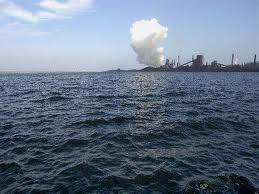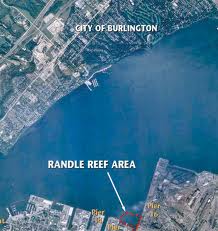BURLINGTON, ON May 13, 2012 They could have and perhaps should have held the event in Burlington but instead they are holding it in Hamilton. While we are a Burlington publication, the event: Great Lakes Need Great Friends; Protecting The Great Lakes Forever, being held May 16 at 7:30 p.m. in the Hamilton First Unitarian Church, 170 Dundurn St. South, is important enough to get mentioned here.

That is not a healthy cloud - more like a marker telling you where Randall Reef is located - the second worst toxic site in the country.
Given that Hamilton has done as much as anyone else to come close to killing the lake and is home to the second worst toxic site in on our side of the Great Lakes perhaps the event is being held there to shame the city. The plan to cap Randall Reef are kind of on hold – they’re still figuring out who is going to pay for the concrete cap that has to be put over the sludge that has accumulated from years of exploiting the natural water in the lake with waste from the steel mills and the coke ovens that once supplied the gas to light the street lamps in that city.
Maude Barlow, The Council of Canadians along with Mark Mattson, Lake Ontario Waterkeepers and Linda Lukasik, Executive Director of Environment Hamilton will talk about just how bad the situation is and what has to be done to begin cleaning up Lake Ontario.
Getting a good start at the Hamilton end is an admirable first step but given the rate at which the federal government is killing the whole environmental review process – don’t expect to see all that much done by the federal government. For them it is all about jobs – most of which might well be at hospices where the cancer patients can end their days after years of being exposed to toxic waste.

Randall Reef - The second worst environmental waste deposit in the country is pretty close to home isn't it
The Hamilton event is part of an eight Canadian city tour, with allied groups, several U.S. cities the “Great Lakes Needs Great Friends” Tour hopes to foster connections along the Great Lakes by making the links between current fights against threats such as “fracking”, bottled water withdrawals, invasive species, and nuclear waste storage and shipments.
Another objective is to cultivate a Great Lakes stewardship by encouraging people to recognize they not only have a right, but a responsibility to protect the Great Lakes’ waters. Ideally this will invite community involvement and encourage inspiring actions that will help shift the current market economy priorities that govern the Great Lakes to priorities based on commons and public trust principles.
Maud Barlow, who is a delight to listen to, will tell anyone with a minute of time, that “protecting the future of the Great Lakes is in all of our hands. When communities come together with passion and purpose, they can change political priorities and shape a better future for our shared water.”
Sometime this week you will get to the lakefront – pause and ask yourself what you can do to improve what we have. Next time you see Mike Wallace, the person Burlington sends to Ottawa, ask him what he is doing to help; listen carefully and ask him tough questions. His first position is to usually try and snow people.


















